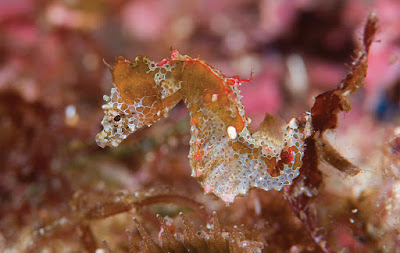 |
| Hippocampus japapigu
Short, Smith, Motomura, Harasti & Hamilton, 2018
|
Abstract
The pygmy seahorse Hippocampus japapigu sp. n. is described based on three specimens, 13.9–16.3 mm SL, collected from a mixed soft coral and algae reef at 11 m depth at Hachijo-jima Island, Izu Islands, Japan. The new taxon shares morphological synapomorphies with the previously described central Indo-Pacific pygmy seahorses, H. colemani, H. pontohi, H. satomiae, and H. waleananus, including extremely small size, 12 trunk rings, strongly raised continuous cleithral ring, snout spine, large spine on the eighth lateral and fifth and 12 superior trunk ridges, respectively, and unusual wing-like-protrusions immediately posterior to the head. Hippocampus japapigu sp. n. can be distinguished from all congeners by the following combination of features in the anterodorsal area of the trunk: bilaterally paired wing-like protrusions formed by a single pair of large, truncate spines projecting dorsolaterad on the first superior trunk ridge, followed by a unique elevated dorsal ridge formed by triangular bony mounds dorsally on the second to fourth superior trunk ridges. In contrast, H. pontohi possesses a pair of large truncate spines projecting strongly laterad on both the first and second superior trunk ridges followed by flat surfaces dorsally on the third and fourth superior trunk rings. The new species can be further differentiated by genetic divergence from H. pontohi (an uncorrected p-distance of 10.1% in the mitochondrial COI gene) and a striking reticulated white and brown lattice pattern on the head, trunk, and tail. Hippocampus japapigu sp. n. represents the fifth species of pygmy seahorse recorded in Japan.
Keywords: Acanthomorpha, computed tomography, reef fish, new species, systematics, taxonomy, computed tomography
 |
| Figure 1. Hippocampus japapigu, UW 157506, female holotype directly after collection, 16.33 mm SL, Hachijo-jima Island, Izu Islands, Japan (photograph Hiroyuki Motomura). |
Hippocampus japapigu sp. n.
Diagnosis. Hippocampus japapigu sp. n. differs from its congeners by the following combination of characters: tail rings 28; dorsal fin rays 14; pectoral fin rays nine; subdorsal rings four; bilaterally paired wing-like protrusions formed by a pair of large truncate spines projecting laterad on first superior trunk ridge; elevated dorsal ridge formed by unique triangular bony mounds dorsally on second, third, and fourth trunk rings with the posterior mound less pronounced; large and prominent spine projecting laterad on eighth lateral trunk ridge.
 |
| Figure 4. Hippocampus japapigu in situ, Hachijo-jima Island, Izu Islands, Japan at 15 m depth (photograph Richard Smith). |
 |
| Figure 5. Hippocampus japapigu in situ, Hachijo-jima Island, Izu Islands, Japan from 10 m depth (photograph Richard Smith). |
Distribution and habitat: Hippocampus japapigu sp. n. is only known to occur in Japan, from scattered localities including Kashiwa-jima Island, Sukumo Bay; Kushimoto, Kii Peninsula; Osezaki, Izu Peninsula; the Izu Islands of Miyake and Hachijo; Sagami Bay; and Chichi-jima, Ogasawara Islands. The specimens described herein were found off the northwest coast of Hachijo-jima Island at a depth of 10–13 m, and have been anecdotally reported elsewhere at 5–22 m by local divers. Owing to its diminutive size and extraordinary crypsis, this species may have a wider distribution within Japan. The new taxon is not associated with a particular host, and has been observed in association with mixed soft coral, the coralline algae Halimeda sp., and hydroids on rocky reef walls and large boulders in both exposed and semi-sheltered locations. During 15 dives initially spent searching ad hoc for this species by the second author in July 2013, 13 individuals were observed in an approximately 100 m stretch of rocky reef. These ranged in depth from 10 to 20 m and water temperature fluctuated between 19–24°C over 6 days. When one individual was discovered, another was often found in close proximity and appeared to represent male-female pairs. Returning in June 2015 with a larger group of experienced dive guides, with 10 dives searching for the species, only a single individual was found, possibly suggesting fluctuations in the abundance of the species. Several pregnant males were observed in July 2013, but it is unknown whether reproduction occurs seasonally or year-round.
Etymology: The specific epithet is from the colloquial Japanese name of the new species, Japan Pig, Japapigu, or 日本のピグミータツノオトシゴ.
Common name: New common English and Japanese names, Japanese Pygmy Seahorse and Hachijo-tatsu, respectively, are proposed here for Hippocampus japapigu.
Graham Short, Richard Smith, Hiroyuki Motomura, David Harasti and Healy Hamilton. 2018. Hippocampus japapigu, A New Species of Pygmy Seahorse from Japan, with A Redescription of H. pontohi (Teleostei, Syngnathidae). ZooKeys. 779: 27-49. DOI: 10.3897/zookeys.779.24799





